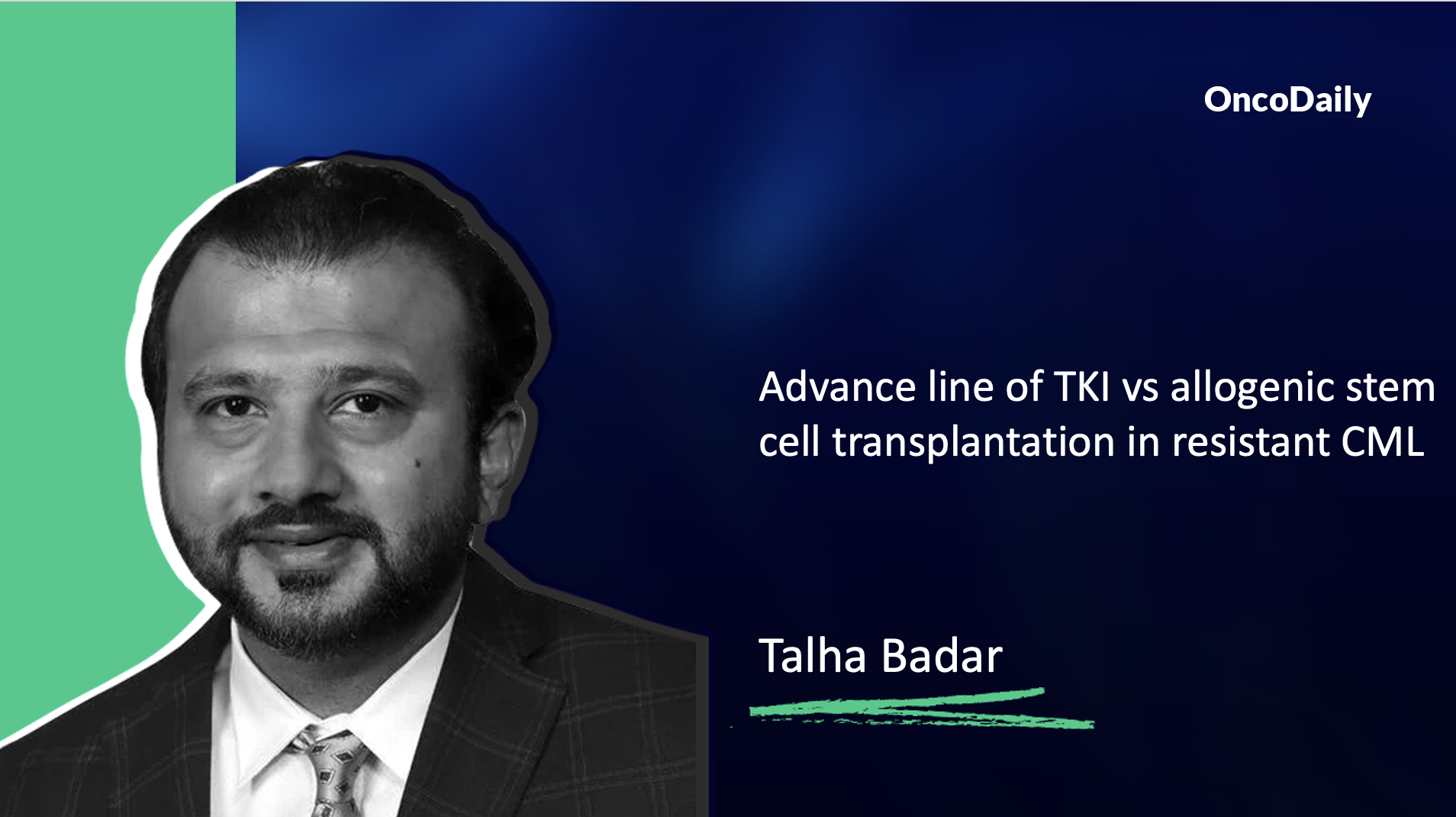Talha Badar shared a post on X:
”Treatment of resistant chronic myeloid leukemia (CML); advanced line of tyrosine kinase inhibitors (TKI) versus allogeneic stem cell transplantation.
1. Life expectancy of chronic phase chronic myeloid leukemia almost normalized. (Bower H et al. J Clin Oncol. 2016;34:2851-7)
Authors: Hannah Bower, Magnus Björkholm, Paul W Dickman, Martin Höglund, Paul C Lambert, Therese M-L Andersson.
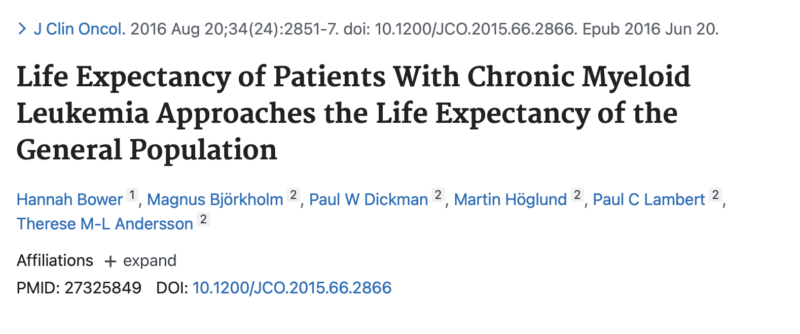
2. In chronic myeloid leukemia phases, the incidence of blast crisis decreased with the advent of tyrosine kinase inhibitors (Hehlmann et al. Blood 2013; Leukemia 2017), reducing to 1-1.5% per year.
3. Why the debate is important: 20-30% of patients with chronic myeloid leukemia will not achieve an optimal response with current second- and third-generation tyrosine kinase inhibitors (Dasatinib, Nilotinib, Bosutinib, and Ponatinib).
Transplantation in CML in the TKI era: who, when, and how?
Authors: Christian NiederwieserNicolaus Kröger.

4. Resistance mutations in chronic myeloid leukemia and how we approach them, as well as molecular milestones to follow in chronic phase chronic myeloid leukemia treatment.
Resistance mutations in CML and how we approach them.
Author: Simona Soverini.

5. What is the best option for ‘non-optimal responders’?
Ponatinib, after failure of second-generation tyrosine kinase inhibitors, has shown impressive responses. Response-based dosing, as demonstrated in the OPTIC trial, has improved tolerability and survival.
Authors: Hagop M. Kantarjian, Elias Jabbour, Michael Deininger, Elisabetta Abruzzese, Jane Apperley, Jorge Cortes, Charles Chuah, Daniel J. DeAngelo, John DiPersio, Andreas Hochhaus, Jeffrey Lipton, Franck E. Nicolini, Javier Pinilla-Ibarz, Delphine Rea, Gianantonio Rosti, Philippe Rousselot, Neil P. Shah, Moshe Talpaz, Shouryadeep Srivastava, Xiaowei Ren, Michael Mauro.
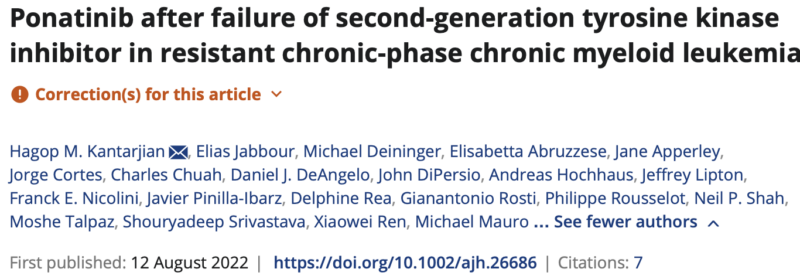
6. Asciminib after failure of two prior tyrosine kinase inhibitors.
Authors: Delphine Réa, Michael J. Mauro, Carla Boquimpani, Yosuke Minami, Elza Lomaia, Sergey Voloshin, Anna Turkina, Dong-Wook Kim, Jane F. Apperley, Andre Abdo, Laura Maria Fogliatto, Dennis Dong Hwan Kim, Philipp le Coutre, Susanne Saussele, Mario Annunziata, Timothy P. Hughes, Naeem Chaudhri, Koji Sasaki, Lynette Chee, Valentin García-Gutiérrez, Jorge E. Cortes, Paola Aimone, Alex Allepuz, Sara Quenet, Véronique Bédoucha, Andreas Hochhaus.
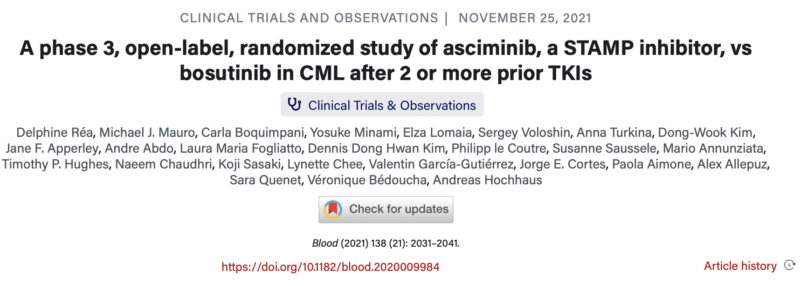
7. When should chronic myeloid leukemia (CML) patients be considered for allogeneic hematopoietic cell transplantation (allo-HCT)?
European LeukemiaNet (ELN):
- Disease resistant to multiple tyrosine kinase inhibitors (TKIs).
- Inadequate recovery of normal hematopoiesis.
Patient progressing on multiple TKIs including ponatinib/asciminib:
- Should allo-HCT be performed immediately after TKI or after subsequent chemotherapy?
National Comprehensive Cancer Network (NCCN):
- No clear recommendations; emphasizes shared decision-making with the patient.
European LeukemiaNet 2020 recommendations for treating chronic myeloid leukemia.
Authors: A. Hochhaus, M. Baccarani, R. T. Silver, C. Schiffer, J. F. Apperley, F. Cervantes, R. E. Clark, J. E. Cortes, M. W. Deininger, F. Guilhot, H. Hjorth-Hansen, T. P. Hughes, J. J. W. M. Janssen, H. M. Kantarjian, D. W. Kim, R. A. Larson, J. H. Lipton, F. X. Mahon, J. Mayer, F. Nicolini, D. Niederwieser, F. Pane, J. P. Radich, D. Rea, J. Richter, G. Rosti, P. Rousselot, G. Saglio, S. Saußele, S. Soverini, J. L. Steegmann, A. Turkina, A. Zaritskey, R. Hehlmann.
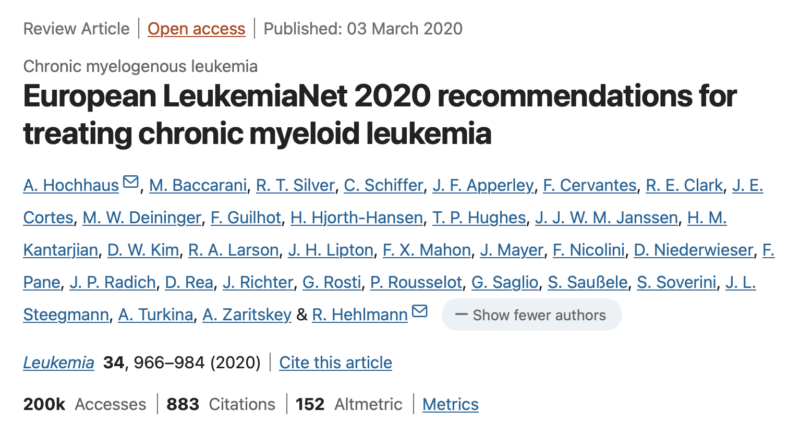
8. Allogeneic stem cell transplantation over the years 1997 to 2021.
Patients in recent cohorts have received transplants at older ages and later in the disease course.
Despite these higher risks, the outcomes of allogeneic hematopoietic cell transplantation (allo-HCT) have not worsened over time but have not improved either.
Authors: Dominik Heim, Helen Baldomero, Michael Medinger, Stavroula Masouridi-Levrat, Urs Schanz, Gayathri Nair, Tayfun Güngör, Jörg Halter, Jakob R. Passweg, Yves Chalandon, Swiss Stem Cell Transplantation Group.
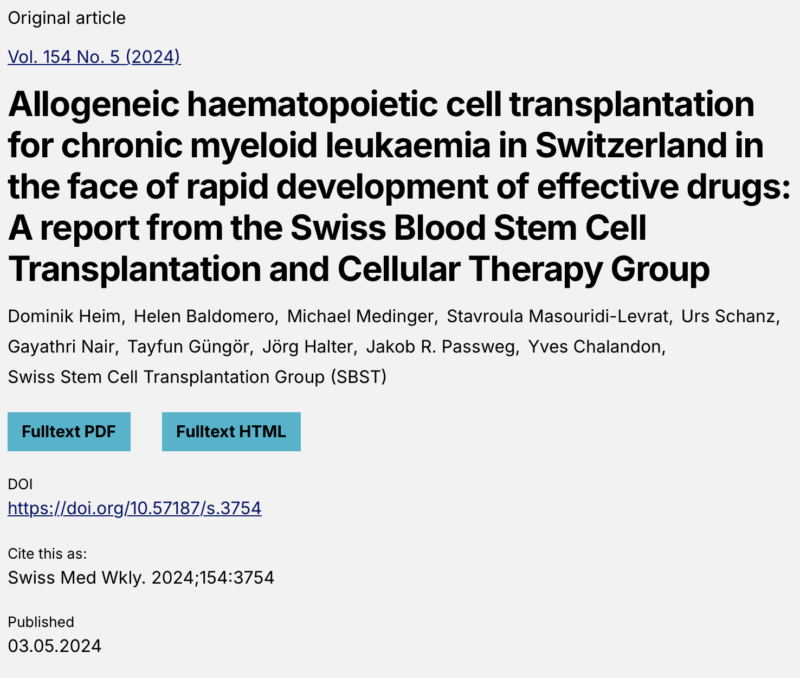
Conclusion:
- Patients without an optimal response after multiple tyrosine kinase inhibitors (TKIs) should receive new-generation TKIs while in chronic phase.
- Therapy-resistant BCR-ABL1 mutations, high-risk additional cytogenetic abnormalities, and molecular signs of leukemia progression should prompt the indication for hematopoietic stem cell transplantation (HSCT).
- Patients who, despite dose adjustments, do not tolerate or develop severe adverse events (AEs), including vascular events, to multiple TKIs are also candidates for HSCT.
- In advanced-phase chronic myeloid leukemia (CML), TKIs do not provide long-lasting results. The outcome of HSCT is less optimal without pretransplant therapy; thus, combining TKI with chemotherapy prior to allo-HCT is warranted.”
Source: Talha Badar/X
Talha Badar, MD, is a specialist in Hematology Oncology based in Mayo Clinic, Jacksonville, Florida. His primary areas of expertise include Leukemia, particularly Acute Myeloid Leukemia (AML), Myelodysplastic Syndrome (MDS), Acute Lymphoblastic Leukemia (ALL), and Bone Marrow Transplantation. Over his career, he has actively contributed to clinical research and clinical trials.
